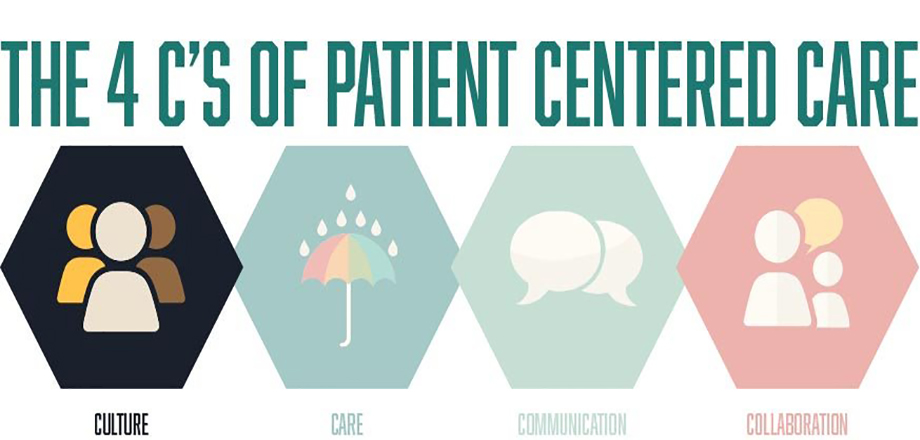Patient-Centred Care: Enhancing Skills through Health Service Courses
Healthcare is more than just complex treatment and intricate procedures. It’s patient-centred care that has the power to heal and transform lives. Patient-centred care places the individual, their needs, and their values at the forefront of healthcare interactions.
It recognises that the human experience extends beyond the physical ailment, embracing the emotional, psychological, and social aspects of healing. By prioritising patient-centred care, healthcare professionals can create an environment where dignity, empathy, and respect flourish, ultimately leading to improved outcomes and patient satisfaction.

Understanding patient-centred care
Patient-centred care is a philosophy that places patients at the centre of the healthcare experience, recognising their unique needs, preferences, and values. It goes beyond focusing solely on medical treatments and embraces a holistic approach that considers the physical, emotional, and social aspects of a patient’s well-being.
The principles of patient-centred care revolve around respect and empathy while involving them in decision-making about their health and course of treatment. It also emphasises clear and open communication, fostering trust and building a therapeutic relationship between patients and healthcare professionals.
The key principles of patient-centred care include:
Patient-centred care recognises the patient as an active participant in their healthcare journey. It involves engaging patients in discussions, considering their perspectives, and involving them in decisions regarding their treatment options.
It respects and honours the values, beliefs, and cultural backgrounds of each patient. It acknowledges that patients have the right to make informed decisions about their care based on their personal preferences.
Patient-centred care takes into account the physical, emotional, social, and psychological aspects of a patient’s well-being. It focuses not only on treating the disease but also on promoting overall wellness and quality of life.
Patient-centred care places great importance on open and effective communication between healthcare providers and patients. It encourages active listening, clear and understandable explanations, and the exchange of information to support shared decision-making between patients and their healthcare team.
Benefits of patient-centred care for healthcare professionals
Patient-centred care is highly beneficial for healthcare professionals in numerous ways:
- Improved healthcare outcomes: Patient-centred care has been linked to better health outcomes, including increased patient satisfaction, improved adherence to treatment plans, and better management of chronic conditions.
- Enhanced patient satisfaction: By involving patients in their care, considering their preferences, and addressing their concerns, patient-centred care improves patient satisfaction. Patients feel valued, heard, and respected, leading to a positive healthcare experience.
- Increased patient engagement and empowerment: Patient-centred care empowers patients to participate in their healthcare decisions actively. It promotes patient education, shared decision-making, and self-management skills, enabling patients to take control of their health and well-being.
Enhanced Job Satisfaction: By prioritising patient-centred care, healthcare professionals experience greater fulfilment and satisfaction in their work. The ability to provide personalised care and witness the positive impact on patients’ lives brings a deep sense of purpose and joy to their professional journey.
The role of Health Service Courses is pivotal in developing patient-centred care skills among healthcare professionals. These courses provide comprehensive training that goes beyond technical knowledge, emphasising the importance of empathy, communication, and understanding the unique needs of patients.
By enrolling in a health service course, healthcare professionals can gain a deeper understanding of the principles and practices of patient-centred care. They learn effective communication techniques to establish a rapport with patients, actively listen to their concerns, and provide information in a compassionate and understandable manner.
Furthermore, such courses emphasise the importance of cultural sensitivity, respecting diversity, and tailoring care to meet individual preferences. Health service courses also provide hands-on training, allowing participants to practise patient-centred care skills in simulated environments.
This certification course is a comprehensive program designed to equip individuals with the necessary skills and knowledge to pursue a rewarding career in the healthcare industry. HLT33115 Certificate III in Health Services Assistance is a nationally recognised certification that provides a solid foundation for those seeking to work as health service professionals, supporting the delivery of patient-centred care across a variety of healthcare settings.
The certification covers a wide range of topics, including healthcare ethics, infection prevention and control, assisting with client movement, and contributing to the care of patients with chronic conditions. Participants learn essential skills such as communication, teamwork, and problem-solving, which are critical in providing quality care and ensuring positive patient experiences.
Throughout the course, students get an opportunity to gain practical experience through work placement in healthcare settings. This allows them to apply their knowledge in real-world scenarios, further enhancing their skills and understanding of patient care.
With a focus on patient-centred care and a comprehensive curriculum, the HLT33115 Certificate III in Health Services Assistance prepares individuals to positively impact patients’ lives and contribute to the community’s overall well-being.
Healthcare is a rapidly growing industry, and there is a strong demand for skilled professionals who can provide quality care and support to patients. Graduates of the HLT33115 Certificate III in Health Services Assistance can explore various career opportunities within the healthcare sector.
The job prospects for Health Services Assistants are promising, with a wide range of employment options available in hospitals, medical clinics, aged care facilities, and community health centres.
Some potential job roles may include:
- Nursing Assistant
- Ward assistant
- Patient support assistant
- Health service assistant
- Hospital orderly



The HLT33115 Certificate III in Health Services Assistance is designed with a strong focus on patient-centred care principles. The course curriculum integrates the core concepts of understanding and addressing the unique needs of patients, promoting their active participation in their own care, and fostering a compassionate and empathetic approach towards patients.
Through this certification, students are exposed to various competencies that emphasise the importance of patient-centred care. They learn about effective communication strategies, including active listening and empathy, which are essential for building strong relationships with patients. Students also gain insights into cultural sensitivity, respecting diversity, and treating patients with dignity and respect.
Conclusion
Health service courses play a crucial role in promoting better patient-centred care within the healthcare industry. The HLT33115 Certificate III in Health Services Assistance stands out as a comprehensive program that equips individuals with the necessary skills and knowledge to provide exceptional support and care to patients.
Looking to start a rewarding career in healthcare? Take the first step towards becoming a skilled and compassionate healthcare professional by enrolling in the HLT33115 Certificate III in Health Services Assistance. DP Training offers comprehensive training programs that equip you with the knowledge and practical skills needed to provide exceptional patient-centred care.
Visit our website or contact us today to learn more about the HLT33115 Certificate III in Health Services Assistance and start your journey towards a fulfilling healthcare career.

Frequently Asked Questions
1. Will I need to complete any work placement as part of the course?Are these online business courses self-paced?
Yes, students will be required to complete at least 80 hours of vocational placement in an approved healthcare setting as a part of this certification. This will provide students with hands-on experience in a healthcare setting under supervision. It allows students to apply their skills and knowledge in a real healthcare environment and gain practical insights into the industry.
2. Is the HLT33115 Certificate III in Health Services Assistance recognised nationally?
Yes, the HLT33115 Certificate III in Health Services Assistance is a nationally recognised certification. It is aligned with the Australian Qualifications Framework (AQF) and is widely accepted within the healthcare industry.
3. Can I complete HLT33115 Certificate III in Health Services Assistance through RPL?

Yes, completing the HLT33115 Certificate III in Health Services Assistance through Recognition of Prior Learning (RPL) is possible. Candidates who can successfully demonstrate that they have acquired the required knowledge and skills through formal, non-formal, and informal learning can apply for RPL assessment.





